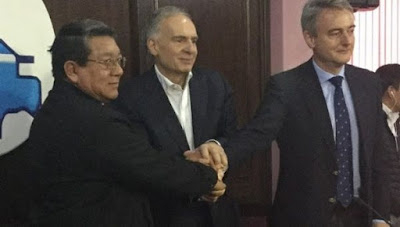United Nations Presents a Peace-Building Agreement for Bolivia
Monsignor Aurelio Pesoa (L), UN envoy Jean Arnault (R) and EU ambassador Leon De la Torre (C) in La Paz, Bolivia, Nov. 23, 2019.
23 November 2019
Telesur
The Movement Towards Socialism and the Añez administration agreed to pass laws to make viable new elections without Evo Morales as a candidate.
The United Nations, the European Union (EU) and the Bolivian Episcopal Conference (CEB) on Saturday announced an agreement between the Movement Towards Socialism (MAS) and the Jeanine Añez administration whereby they pledge to pacify Bolivia and ensure credible elections.
The agreement was presented at a press conference by the UN special envoy Jean Arnault, the EU ambassador to Bolivia Leon de la Torre and the CEB president Aurelio Pesoa, who thanked political actors for their willingness to send a message of tranquility to the Bolivian people.
The new political deal seeks to overcome the crisis, protect life, contain and prevent violence, ensure respect for human rights, promote dialogue, and ensure the holding of elections as soon as possible.
To achieve all this, the United Nations will undertake a "Peacebuilding Program" which contemplates facilitating a dialogue table and supporting efforts to prevent and overcome conflicts. These tasks will be carried out especially in the areas most affected by violence.
Effective international monitoring will be established to prevent the recurrence of "tragic events" which have been taking place since Oct. 20, when President Evo Morales was forced to resign.
The plenary session of the Bolivian Senate unanimously approves the "Exceptional and Transitional Regime for General Elections" Law.
The agreement also specifies that the State must commit to carrying out transparent, impartial and effective investigations to punish those who violated human rights.
The United Nations will also provide technical assistance to Bolivia's Supreme Electoral Tribunal and subnational electoral courts so that the next election meets the highest standards.
To ensure the full, free and secure participation of the Bolivian Indigenous peoples, the United Nations will set subnational monitoring mechanisms before, during, and after the polls.
On Saturday, the Senate unanimously approved the "Exceptional and Transitional Regime for General Elections" Law, which was proposed by the MAS to facilitate the resolution of the political crisis.
According to the this law's provisions, former President Morales will not be allowed to participate as a candidate in the upcoming elections.
Monsignor Aurelio Pesoa (L), UN envoy Jean Arnault (R) and EU ambassador Leon De la Torre (C) in La Paz, Bolivia, Nov. 23, 2019.
23 November 2019
Telesur
The Movement Towards Socialism and the Añez administration agreed to pass laws to make viable new elections without Evo Morales as a candidate.
The United Nations, the European Union (EU) and the Bolivian Episcopal Conference (CEB) on Saturday announced an agreement between the Movement Towards Socialism (MAS) and the Jeanine Añez administration whereby they pledge to pacify Bolivia and ensure credible elections.
The agreement was presented at a press conference by the UN special envoy Jean Arnault, the EU ambassador to Bolivia Leon de la Torre and the CEB president Aurelio Pesoa, who thanked political actors for their willingness to send a message of tranquility to the Bolivian people.
The new political deal seeks to overcome the crisis, protect life, contain and prevent violence, ensure respect for human rights, promote dialogue, and ensure the holding of elections as soon as possible.
To achieve all this, the United Nations will undertake a "Peacebuilding Program" which contemplates facilitating a dialogue table and supporting efforts to prevent and overcome conflicts. These tasks will be carried out especially in the areas most affected by violence.
Effective international monitoring will be established to prevent the recurrence of "tragic events" which have been taking place since Oct. 20, when President Evo Morales was forced to resign.
The plenary session of the Bolivian Senate unanimously approves the "Exceptional and Transitional Regime for General Elections" Law.
The agreement also specifies that the State must commit to carrying out transparent, impartial and effective investigations to punish those who violated human rights.
The United Nations will also provide technical assistance to Bolivia's Supreme Electoral Tribunal and subnational electoral courts so that the next election meets the highest standards.
To ensure the full, free and secure participation of the Bolivian Indigenous peoples, the United Nations will set subnational monitoring mechanisms before, during, and after the polls.
On Saturday, the Senate unanimously approved the "Exceptional and Transitional Regime for General Elections" Law, which was proposed by the MAS to facilitate the resolution of the political crisis.
According to the this law's provisions, former President Morales will not be allowed to participate as a candidate in the upcoming elections.

No comments:
Post a Comment